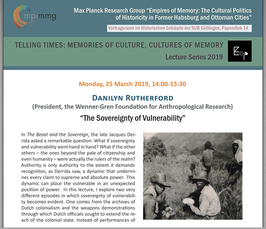"The Sovereignty of Vulnerability"
Telling Times: Memories of Culture, Cultures of Memory - Lecture Series 2019
- Datum: 25.03.2019
- Uhrzeit: 14:00 - 15:30
- Vortragende(r): Danilyn Rutherford (President, the Wenner-Gren Foundation for Anthropological Research)
- Danilyn Rutherford is the president of the Wenner-Gren Foundation for Anthropologi-cal Research. Before joining Wenner-Gren, she was on the faculty at the University of Califor-nia, Santa Cruz and the University of Chicago. She is the author of three books: Raiding the Land of the Foreigners: The Limits of the Nation on an Indonesian Frontier (Princeton, 2003), Laughing at Leviathan: Sovereignty and Audi-ence in West Papua (Chicago, 2012) and Living in the Stone Age: The Origins of a Colonial Fantasy (Chicago, 2018). She is currently working on ethnographic memoir on disability, subjec-tivity, and sign use in the United States.
- Ort: MPI-MMG, Hermann-Föge-Weg 12, Göttingen
- Raum: Vortragsraum im Historischen Gebäude der SUB Göttingen, Papendiek 14

For more details please contact cziesielsky(at)mmg.mpg.de.
In The Beast and the Sovereign, the late Jacques Derrida asked a remarkable question: What if sovereignty and vulnerability went hand in hand? What if the other others – the ones beyond the pale of citizenship and even humanity – were actually the rulers of the realm? Authority is only authority to the extent it demands recognition, as Derrida saw, a dynamic that undermi-nes every claim to supreme and absolute power. This dynamic can place the vulnerable in an unexpected position of power. In this lecture, I explore two very different episodes in which sovereignty of vulnerabili-ty becomes evident. One comes from the archives of Dutch colonialism and the weapons demonstrations through which Dutch officials sought to extend the re-ach of the colonial state. Instead of performances of potency, these demonstrations devolved into perfor-mances of vulnerability, with the most benighted inha-bitants of the colonial Indies, the so-called Stone Age Papuans, appearing in the guise of sovereign power. The other comes from my new ethnographic work on speech therapy and the communities of sign use that emerge around non-verbal people. Here as well, I con-sider scenes where the indicators of recognition are idiosyncratic and fleeting and the participants who seem to have the most power and authority turn out to have the least control over their signs. The violence associated with claims to sovereignty may stem from the sovereignty of vulnerability – a possibility that could well leave us wondering whether sovereignty is ever what it seems.